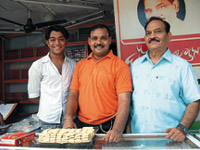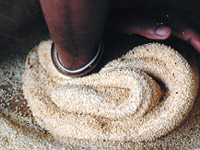


|
|
|
DAULATRAM Gupta is the King of Gajak in Gwalior. His Morena Gajak Bhandar is renowned all over the city for its Gajak, sweets and �namkeen� items. But Daulatram himself, a happy and smiley man, is keen only on discussing the Gajak. This is a simple sweet made of sesame, sugar and ghee and tastes almost like the chikki that is available at railway stations in Maharashtra. It is different from chikki, however. Daulatram�s shop, located at Shri Anturam Shivhare Chowk, Naya Sadak, is 40 years old. He started it himself with a Gajak �formula� and labour brought down by his wife from Morena, which is 35 km away from Gwalior. His success and popularity bred immitations, and soon every other shop was advertising its Gajak as being from Morena, though none could match Daulatram�s quality. So, modestly, Daulatram decided to name his establishment after himself. �Nobody could copy my name,� he said simply. Better still, he put his photograph on the sweetboxes in which the Gajak was packed, and also on his visiting cards, the signboards, etc. The message was unmistakable, Gajak in Gwalior had to be associated only with Daulatram Gupta. Today the shop does a thriving business, it is run from 9 a.m. to 10 p.m., and sells huge quantities of Gajak every day. Daulatram�s son Vinod and grandson Kulveer who work the business with him, say that they don�t keep tabs on how much of Gajak they make every day, but they sell all their stock! They are a well-liked family in Gwalior and count among their clients Atal Bihari Vajpayee and the classical singer Kishori Amonkar. Actually, Vajpayeeji turns out to be quite a foodie with a sweet tooth. Most of Gwalior�s sweet marts claim to be supplying him with some goodies or the other. But Daulatram has proof to show that his clientele is indeed eclectic. He produces a visitor�s book and a CD which contains a Doordarshan documentary on Gajak featuring him! �Our Gajak goes all over,� he said, �we don�t send it ourselves, but people buy and take it, they even take it abroad. The Gajak has a one-month shelf life in winter. In summer, it stays for 15 days. But one American doctor, a NRI by the name if Rajesh Saini, kept my Gajak for over a year. And he recommends it as a tonic!� The Mother�s Charter for Auroville even in 1968 was simple and clearly stated: Auroville belongs to nobody in particular, Auroville belongs to humanity as a whole, but to live in Auroville one must be a willing servitor of the Divine Consciousness; Auroville will be the place of unending education, of constant progress, and a youth that never ages; Auroville wants to be the bridge between the past and the future, taking advantage of all discoveries from without and from within, Auroville will boldly spring towards future realisations; Auroville will be a site of material and spiritual researches for a living embodiment of an actual Human Unity.
|

Home Page
About the mag
Subscribe
Advertise
Contact Us
 Kamaal Ka Gajak!
Kamaal Ka Gajak!
 Gajak is traditionally a winter delicacy, sesame being a winter crop. And the Gajak, which contains sugar and ghee, is an energy-giving sweet for cold climes. The sesame contains lot of oil, the sugar gives the energy, and the ghee produces the heat. Eat Gajak and stay warm and healthy, that�s what Daulatram Gupta�s sweet boxes say! He sells six varieties of Gajak, including the popular Gur Gajak made of jaggery, and Gajaks made of Sugar, Kaju, Dryfruit, Revdi and Chikki. The Gur and Sugar Gajaks cost Rs. 100 a kg, the Dryfruit one is Rs. 120, and all the others are for Rs. 80. In Gujarat, a Gajak is made of a combination of nuts that incorporate almonds, walnuts, pecans, macadamias, pine nuts, pistachios and cashew nuts. Cardamom is the flavouring agent, though the Gujaratis also flavour their Gajak with ginger, clove and cassia bud. There is also a Persian version of the Gajak in which, incredibly, rose water is introduced. It is popular in the Middle East where sesame and sunflower seeds are commonly available at Indian grocery stores. Daulatram Gupta says the formula for his Morena Gajak lies with his grandmother, Usha Gupta. He knows the formula but does not make the Gajak himself. �I have Morena workers to do it,� he said. And in a small workshop behind his shop, the Gajak factory keeps busy, producing tons of the sweetmeat.
Gajak is traditionally a winter delicacy, sesame being a winter crop. And the Gajak, which contains sugar and ghee, is an energy-giving sweet for cold climes. The sesame contains lot of oil, the sugar gives the energy, and the ghee produces the heat. Eat Gajak and stay warm and healthy, that�s what Daulatram Gupta�s sweet boxes say! He sells six varieties of Gajak, including the popular Gur Gajak made of jaggery, and Gajaks made of Sugar, Kaju, Dryfruit, Revdi and Chikki. The Gur and Sugar Gajaks cost Rs. 100 a kg, the Dryfruit one is Rs. 120, and all the others are for Rs. 80. In Gujarat, a Gajak is made of a combination of nuts that incorporate almonds, walnuts, pecans, macadamias, pine nuts, pistachios and cashew nuts. Cardamom is the flavouring agent, though the Gujaratis also flavour their Gajak with ginger, clove and cassia bud. There is also a Persian version of the Gajak in which, incredibly, rose water is introduced. It is popular in the Middle East where sesame and sunflower seeds are commonly available at Indian grocery stores. Daulatram Gupta says the formula for his Morena Gajak lies with his grandmother, Usha Gupta. He knows the formula but does not make the Gajak himself. �I have Morena workers to do it,� he said. And in a small workshop behind his shop, the Gajak factory keeps busy, producing tons of the sweetmeat.